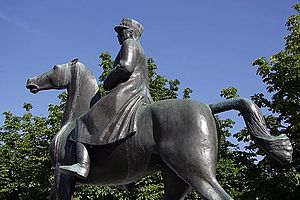Henri Guisan

Henri Guisan (21 October 1874 - 7 April 1960) was a Swiss army officer, and held the office of the General of the Swiss Army during World War II. He was the fourth and the most recent man to be appointed to the rarely-used Swiss rank of General, and was possibly Switzerland's most famous soldier. He is best remembered for effectively mobilizing the Swiss army and Swiss people in order to prepare resistance against a possible invasion by Nazi Germany in 1940.
Family and career

Henri Guisan was born in 1874 in Mézières, in the canton of Vaud, a Protestant part of French-speaking Switzerland. He was the descendant of Huguenot Protestants who emigrated from France in 1685. He attended school in Lausanne, and initially studied agricultural medicine. Upon entering the Swiss military in 1894, he was assigned to a horse-drawn artillery unit in Biere as a Lieutenant. He was promoted several times, reaching the rank of Colonel in 1920.
Defence of the nation

On 28 August 1939, a Federal Assembly called a United Federal Assembly to elect a General: a unique rank chosen only in time of war or national emergency. On 30 August 1939, Guisan was elected as General, by 204 votes to 21 for Jules Borel.[1] He was given the directive to safeguard the independence of the country and to maintain the integrity of the Swiss territory. In 1939 the Swiss military could muster 430,000 troops, approximately 20% of the work force. However, Swiss military equipment was not on a par with that of the German military.[2]
Guisan's appointment came despite his membership in the Schweizerischer Vaterländischer Verband,[citation needed] a largely pro-Nazi organisation.[3] However, his command was dominated by conflict with the government, who thought him to be too pro-French.[4] Whereas the government preferred an understated neutrality, Guisan opted to call for determined resistance. After the Battle of France, Germany found documents proving that Guisan had been secretly making military preparations with France, despite Swiss neutrality.[4]
On 25 July 1940, General Guisan delivered a historic address to the entire Swiss Officer Corps assembled on the Rütli, a location charged with symbolism in Swiss Romantic nationalism by virtue of being identified as the site of the Rütlischwur of 1291. Guisan became a symbol of resistance to Nazism that was widespread amongst the Swiss public.[4]
He made it very clear that Switzerland would resist any Nazi invasion. If they ran out of bullets they were to resort to the bayonet. He said that Switzerland would defend itself against any invader and would never surrender.[5] The Swiss government had a decentralised structure, so even the Federal President was a relatively powerless official with no authority to surrender the country. Indeed, Swiss citizens had been instructed to regard any surrender broadcast as enemy lies and resist to the end.
As a consequence, General Guisan developed his famous "Reduit Concept" in summer 1940, according to which the Swiss Army would have retreated into the Alps relatively soon if attacked, but would have kept up resistance based on some sort of guerrilla and stay-behind tactics from there. The Swiss paramilitary organization Aktion Nationaler Widerstand (Resistant National Action), formed from contacts between selected army figures and conservative civilian circles, had the explicit task to persuade the civilian population to resist invaders. [6][7]
The main strategy, however, was deterrence rather than fighting. Even though tiny Switzerland had an army of only 430,000 men, Germany never risked invasion. On 20 August 1945, General Guisan left his command, considering his mission to be fulfilled.
He died on 7 April 1960. Asteroid 1960 Guisan has been named in his honour. A road in the city of Lausanne was re-named 'Avenue du General Guisan', a rare event in Switzerland.
See also
Footnotes
- ^ "Resultate der Wahlen des Bundesrats, der Bundeskanzler und des Generals" (PDF). Federal Assembly of Switzerland. Retrieved 4 April 2010.
- ^ Edgar Bonjour, Neutralität, Bd. IV, 1970, p. 379 quoted after Independent Commission of Experts Switzerland - World War II, final report, German edition, p. 92.
- ^ Alan Morris Schom, 'A Survey of Nazi and Pro-Nazi Groups in Switzerland: 1930-1945'
- ^ a b c Haltiner, Karl W. (2002). "The Swiss Security Sector: Structure, Control, Reforms" (PDF). Geneva Centre for the Democratic Control of Armed Forces.
{{cite journal}}: Cite journal requires|journal=(help) - ^ General Henri Guisan: Commander-In-Chief of the Swiss Army in World War II
- ^ The British Secret Service in Neutral Switzerland, Daniele Ganser, in Intelligence and National Security, Vol.20, n°4, December 2005, pp.553-580
- ^ Ganser, p.559
External links
- Centre Général Guisan -- Biography and bibliography, in French and German.
- Hervé de Weck: Henri Guisan in German, French and Italian in the online Historical Dictionary of Switzerland, 2005-01-11.
- Complete genealogy of the Général Guisan on the Geneva Genealogy Society web site
